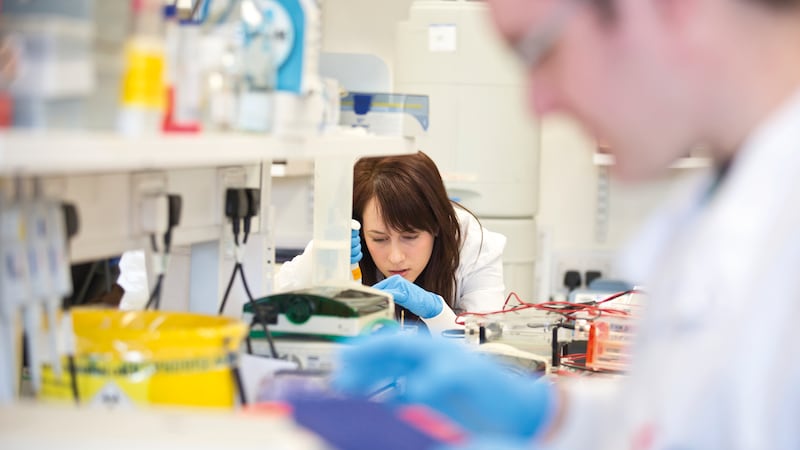IT was a personal crisis that helped turn Edelle into a Samaritan. And her shifts over the last six years in the Belfast office have assisted in managing her own mental health.
"Because I have been there," says the full-time musician. "I've been lonely and desperate and broken and awfully unhappy.
"After coming through that crisis in my life, it's really been great to be able to be there for people in the same situation."
And contrary to what many people might think, Edelle says it is very rare for her to come 'off duty' feeling worse than when she went in.
"Compassion is an underrated human quality. And compassion goes both ways. Peace of mind and joy in life comes from serving others," she explains.
Civil servant Alan is a single parent of two children who has managed working full-time with his shifts as a Samaritan for 20 years.
"I am also involved in coaching. People often ask me how I do it," says the east Belfast man.
"I made a commitment when my first child was born that I would make it work and luckily the shift patterns are very flexible so they have been able to accommodate my home life.
"As a volunteer you realise that life is precious and fragile. The rewards outweigh the demands. It's a humbling experience for someone to share something very deep and personal with you and only you - a stranger at the other end of the phone.
"For them to put their trust in you with their story at that particular time is the ultimate privilege."
Alan and Edelle are two of around 700 volunteers across Northern Ireland who take more than 100,000 calls every year - on the freephone number 116 123 (even from a mobile without credit) or alternatively via the email jo@Samaritans.org.
But having just marked their 60th anniversary in Belfast, Samaritans is an organisation now looking forward and about to unveil a new five-year strategy aimed at reducing the levels of suicide which still pockmark society across the island.
The effect may well be making a once almost amateur organisation more professional, without become corporate.
Samaritans in Northern Ireland has already appointed its first policy and development manager, Ellen Finlay, who has helped work on the blueprint.
"Our goal is to ensure fewer lives are lost to suicide," she explains.
"We aim to achieve this by always being there to listen, by bringing evidence and an experienced voice to suicide prevention, by challenging inequity and by working hand in hand with people who need us every step of the way."
The strategy also aims to help improve access for people needing help and reach individuals more likely to be feeling suicidal.
Ms Finlay continues: "We have worked closely with people who have contacted Samaritans, been affected by suicide or suicidal thoughts, and those who volunteer and work with us or support us, to develop this ambitious plan."
It comes as the latest figures show there were 219 suicides in the north in 2020 - an increase of 14 (equivalent to 7 per cent) on the previous year.
And the NI Statistics and Research Agency (Nisra) has also said the number of apparent suicides prior to 2019 had been increasing primarily as a result of more drug-related deaths.
Called Tackling Suicide Together: Providing a Safe Place in Uncertain Times, the Samaritans' plan also has further goals to recruit more volunteers and ease the pressures on those dealing with the calls.
One priority will be the recruitment of new volunteers but the strategy which will stretch until 2027 has other aims, including:
:: Funding - "securing the necessary resources to sustain services long-term."
:: Governance - "highly effective and professional organisation."
:: Impact - influencing public policy and legislation.
Even before the May election, Samaritans had lobbied the political parties at Stormont for new legislation and regulations, including on how the media reports suicides.
Executive director for Ireland, Niall Mulligan, said: "With our new strategy, we want to do even more to reduce the levels of distress, anxiety, isolation and hopelessness that lead people to contact us in the first place.
"Opportunities exist across the island of Ireland to make real and lasting change and ensure fewer lives are lost to suicide."
Samaritans regional director Alan Heron said there was always a need for more volunteers.
"Volunteers are the lifeblood of the organisation," he said.
"The work the charity is known and respected for is only possible because ordinary people, from all parts of the community, give their time, and for that we will always be grateful."
The organisation plans to work with mental health and other key groups which have dealt with suicide and self-harm to "influence local and national change".
Belfast Trust has the highest suicide rate in Northern Ireland, with 18.8 deaths per 100,000 in 2020 followed by the Southern Trust (14.2 per 100,000), the Nisra exercise shows.
And the most deprived areas have a suicide rate almost twice that of the least deprived areas (19.7 per 100,000 compared to 10.8), the figures show.
There is no such thing as a typical volunteer. Neal, a PhD student, has been through the training process and been a volunteer for two years.
"Before I was a volunteer, I had a few friends approach me to discuss their own mental health. They probably felt they couldn't talk to anyone else," he says.
"The stigma around men's mental health in particular is definitely changing with the younger generations."
Having been a Samaritan, Neal now says he feels much more comfortable about opening up to talk about his own mental health and emotions.
"I'm more of an open book and can speak more freely about what's going on for me. To someone who might be struggling at the moment, I would say reach out," he urges.
"Don't overthink it, just start a conversation. When you start talking about what's going on in your head, it can help you feel clearer."
:: Samaritans can be contacted 24/7, 365 days a year. Freephone 116 123 (even from a mobile without credit) or email jo@Samaritans.org.








